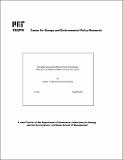| dc.contributor.author | Blanchard, Olivier | en_US |
| dc.contributor.author | Galí, Jordi | en_US |
| dc.contributor.other | Massachusetts Institute of Technology. Center for Energy and Environmental Policy Research. | en_US |
| dc.date.accessioned | 2009-04-09T20:05:15Z | |
| dc.date.available | 2009-04-09T20:05:15Z | |
| dc.date.issued | 2007 | en_US |
| dc.identifier | 2007-011 | en_US |
| dc.identifier.uri | http://hdl.handle.net/1721.1/45126 | |
| dc.description.abstract | We characterize the macroeconomic performance of a set of industrialized economies in the aftermath of the oil price shocks of the 1970s and of the last decade, focusing on the differences across episodes. We examine four different hypotheses for the mild effects on inflation and economic activity of the recent increase in the price of oil: (a) good luck (i.e. lack of concurrent adverse shocks), (b) smaller share of oil in production, (c) more flexible labor markets, and (d) improvements in monetary policy. We conclude that all four have played an important role. | en_US |
| dc.format.extent | 77 p | en_US |
| dc.publisher | MIT Center for Energy and Environmental Policy Research | en_US |
| dc.relation.ispartofseries | MIT-CEEPR (Series) ; 07-011WP. | en_US |
| dc.title | The macroeconomic effects of oil price shocks : why are the 2000s so different from the 1920s? | en_US |
| dc.type | Working Paper | en_US |
| dc.identifier.oclc | 244574931 | en_US |
